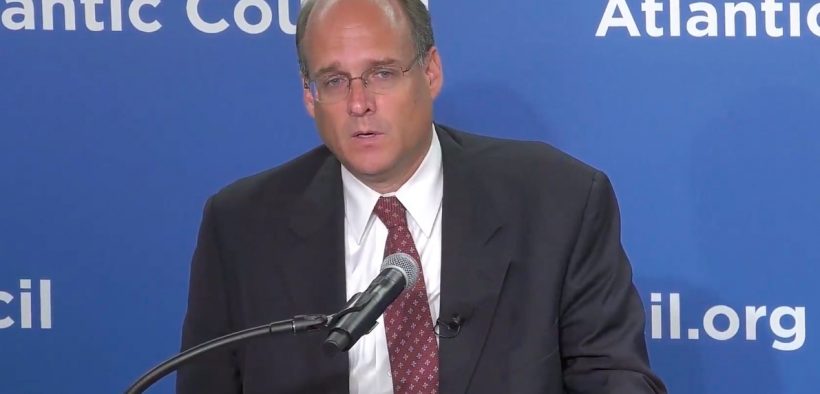Trump Picks Torture Advocate To Lead US Human Rights Policy

“You did support 11 additional enhanced interrogation techniques, which are now illegal. Whether we call them torture or not.”
Human rights advocates have condemned President Trump’s nomination of Marshall Billingslea, a Bush-era torture proponent, to serve as the nation’s top human rights official. The candidate came under fire during a Senate Foreign Relations Committee hearing earlier this month, with Democrats and Sen. Rand Paul arguing he had not been transparent in providing Bush-era documents related to his involvement with torture, “enhanced interrogation,” and other illegal practices.
“From the beginning, it was clear that documents were, according to the [Pentagon], ‘missing’ – missing attachments, missing pages, but each time, the administration, and the chairman’s staff, said that this was it. ‘The search was complete.’ ‘Don’t be ridiculous.’ ‘Stop asking.’ And then, when we pressured, they would find more,” said Sen. Bob Menendez, the senior Democrat on the committee, whose staff began pursuing the memos when Billingslea was first nominated last November, as per Roll Call.
Billinglea serves as the Trump administration’s assistant Treasury secretary for terrorist financing, where he has been a leading figure in sanctioning Venezuelan officials in the Maduro government.
He is now under consideration for the top U.S. executive branch position responsible for human rights policy: undersecretary of State for civilian security, democracy and human rights. The position is tasked with overseeing offices that focus on fighting human trafficking, protecting refugees, pursuing justice for war crimes, and upholding international human rights law.
As a senior Bush administration official, Billingslea ignored international human rights law when sidelining dissenting officials and pushing for the authorization of interrogation techniques other top military lawyer’s argued were unlawful and counterproductive. “Guys, it’s time to wake up and smell the coffee. It’s time to take the gloves off,” Billingslea once said, according to Major General Thomas Romig, who was the Army’s judge advocate general at the time.
At the hearing, Billingslea argued that torture was not illegal in the U.S. until the Feinstein-McCain amendment of 2015, and argued he was caught up in the chaos that followed the September 11 attacks.
“If I were ever called upon — and I hope never to be again — to have a view on these matters, I would without question uphold the law and reject anything not contained in the Army Field Manual,” Billingslea pleaded, arguing he had sought to “bring order to an orderless, chaotic process at Gitmo.”
Critics, such as HRW’s Elisa Epstein and Andrea Prasow, argue that Billingslea violated both domestic and international law, such as “the Universal Declaration of Human Rights, frequently cited by Secretary of State Michael Pompeo, and the International Covenant on Civil and Political Rights, to which the United States is a party, each state that “No one shall be subjected to torture or to cruel, inhuman or degrading treatment or punishment.”
Critics note he also pushed for even harsher practices than other advocates of “enhanced interrogation.”
“You did support 11 additional enhanced interrogation techniques, which are now illegal. Whether we call them torture or not,” said Sen. Rand Paul at the hearing. “I think it’s great now that you don’t believe in torture, and you obey the law, but I do question whether or not this is a problem. At the time, you were advocating … to go beyond even what Rumsfeld was willing to approve.”
Sen. Bob Menendez also dismissed Billingslea’s argument, noting numerous top uniformed lawyers at the time dissented against the practice.
“You were clearly not among the group who sought to oppose that torture,” Menendez said. “What you’re claiming is that you were trying to put order around a disorderly process. Well, that’s bureaucratic jargon. What it means is that you furthered the machinery of torture. You put a process around memos, decisions, et cetera, but you didn’t seek to stop it. You advocated for it, and then you helped advance the development and implementation of torture. So, you can’t change history or hide from it in bureaucratic jargon.”
In an op-ed for Politico, Rob Berschninski and Benjamin Haas of Human Rights First argue that Billingslea’s confirmation would impede the State Department’s ability to enforce international human rights standards.
“How will he confront foreign governments for their human rights violations? When a future Chinese, Venezuelan, Iranian or Saudi government official deflects credible allegations of torture, will they simply say, ‘Marshall, we’re taking the gloves off, just like you did’? You better believe they will.”
Trump has advocated the return of waterboarding and “a hell of a lot worse,” and nominated several Bush-era officials involved with torture, including Billingslea and current CIA head Gina Haspel. While the Trump administration has not implemented these techniques as far as is currently known, critics argue that torture damaged the United States’ reputation and that nominating former officials behind the practice further erodes its authority in promoting human rights.









